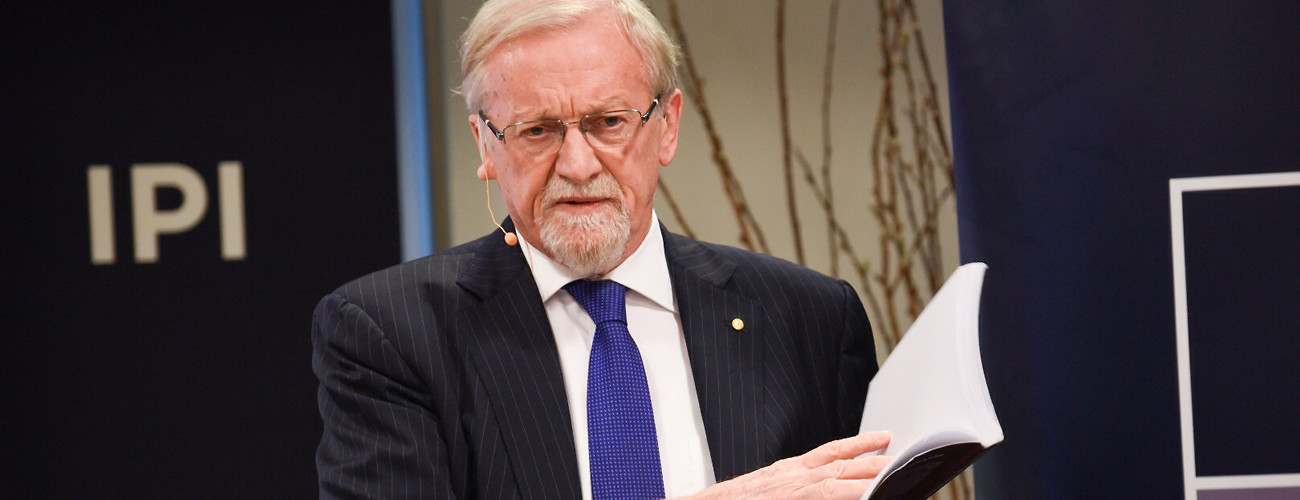Speaking on the eve of the 2015 Non-Proliferation Treaty (NPT) Review Conference at the United Nations, former Australian foreign minister Gareth Evans said the global optimism that had characterized the last review five years ago had largely disappeared, leaving in its wake widespread pessimism over the prospects for a nuclear-free world.
Mr. Evans, speaking at an April 22nd IPI event on “Nuclear Weapons: The State of Play,” said the 2010 NPT Review Conference had ushered in an era of positive feeling for those aspiring to a world without nuclear weapons, largely because of the substantial course of action the conference had set and because of the public position US President Barack Obama had taken on the issue at the time. Five years later, Mr. Evans said, a combination of geopolitical shifts and lack of political will had nullified those achievements.
“There have been some rays of sunshine,” he said, citing a framework nuclear agreement with Iran as well as the emergence of a global movement highlighting the humanitarian consequences of nuclear weapons. “But beyond that,” he said, “overwhelmingly the story has been one of paralysis, it’s been one of minimum forward movement, and it’s been one of significant backsliding.”
The UN High Representative on Nuclear Disarmament Angela Kane agreed with Mr. Evans, pointing to today’s “dismal international climate” and “a stalling in the path to a nuclear-free world.”
This negative climate, Mr. Evans continued, is partly due to a drastic change in the way high-level policymakers view these weapons.
“I think the most worrying general development has been the significant reemergence of old Cold War mindsets, an old Cold War reflex thinking about the deterrent utility of nuclear weapons,” said Mr. Evans, now the chair of the Centre for Nuclear Non-Proliferation and Disarmament (CNND) at the Australian National University in Canberra. A more assertive foreign policy by countries such as Russia and China, Mr. Evans continued, has turned the global debate on nuclear disarmament into a “comfort blanket,” whereby the key arguments questioning the efficacy of nuclear weapons are left unaddressed.
Mr. Evans presented findings from the latest report published by the CNND with assistance from the Stockholm International Peace Research Institute (SIPRI). According to the report’s findings, dated December 2014, non-proliferation and disarmament are the two areas where the global movement has seen the worst setbacks. On the other hand, in the fields of nuclear security and peaceful uses of nuclear energy, there has been some progress.
The report estimates that there are currently 16,372 nuclear warheads distributed among the world’s nine nuclear-armed states—Britain, China, France, India, Israel, North Korea, Pakistan, Russia, and the United States. Of these, four (India, Israel, North Korea, and Pakistan) are outside the NPT.
On disarmament, Mr. Evans said the key question is how serious these states are about a nuclear weapons-free world. The answer, he lamented, is not at all. “None of the nuclear armed states is committed to a specific timetable for the minimization, let alone the abolition, of their nuclear stockpiles.”
The month-long 2015 NPT Review Conference beginning April 27th could be an important moment for both nuclear and non-nuclear states, Ms. Kane said. “All state parties need to affirm that their national interests are best served by faithfully implementing and remaining in strict compliance with the treaty’s mutually reinforcing pillars,” she said. “Member states must remember that the NPT is a bargain, and progress on disarmament and nonproliferation are symbiotic, because one is simply not going to move without the other.”
Mr. Evans acknowledged that within each country, political and military leaders may have differing views on the relevance of nuclear weapons. In the US, for instance, he said there are a number of senior military officials who favor a dramatic reduction in the country’s nuclear stockpile. But, he continued, there is a big political and psychological component to not getting rid of them, one that in France, for example, is particularly strong.
“The French are actually true believers in nuclear weapons,” Mr. Evans said. “They genuinely believe that they are very important for national pride, prestige, and national security.”
Russia is also a hard case, he said, especially given Moscow’s increasing reliance on Cold War language. This was particularly evident in the context of the Crimean crisis, Mr. Evans added, over which Russian President Vladimir Putin said he was ready to put his nuclear forces on alert.
The Chinese case is less clear-cut, Mr. Evans said, and actually offers some promising signs. “China has right from the beginning not staked too much on its nuclear arsenal,” he said. “It’s always operated on the basis of minimal credible deterrent…. It wants to be able to do visible retaliatory damage if it was ever attacked, but it’s still strongly committed—and I think not just rhetorically but genuinely—to a no-first-use posture.”
The conversation was moderated by IPI Senior Adviser for External Relations Warren Hoge.
Watch event:








